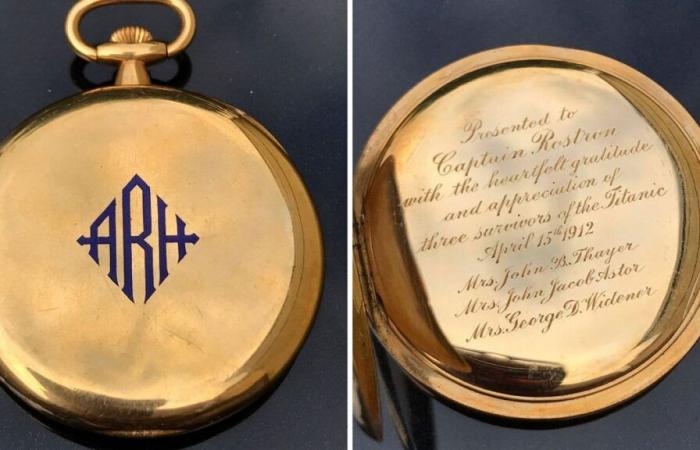This article was originally published in English
The gold pocket watch, recognizing the bravery of the captain who saved 700 passengers from the Titanic, has set an auction record.
ADVERTISEMENT
A gold pocket watch given to the captain of the ship that saved 700 Titanic survivors has been sold at auction for around 1.8 million eurosthus establishing a record for memories of the famous shipwreck.
The 18-karat Tiffany & Co. watch was given to Captain Arthur Rostron for diverting his passenger ship, the RMS Carpathia, to rescue passengers after the Titanic struck an iceberg and sank in the North Atlantic during its maiden voyage in 1912.
This reward was offered by the widow of John Jacob Astor, the richest man to die in the disaster, and by the widows of two other wealthy businessmen who went down with the ship.
Auctioneers Henry Aldridge and Son, who sold the watch to a private collector in the United States on Saturday for £1.56 million (€1.86 million), said it was the highest sum ever paid for a Titanic commemorative item.
The inscription on the watch indicates that it was gifted “with the sincere gratitude and appreciation of three survivors.”
Rostron was hailed as a hero for his actions the night the Titanic sank and his crew was recognized for their bravery. The Carpathia was sailing from New York to the Mediterranean when a radio operator heard a distress call from the Titanic in the early hours of April 15, 1912 and woke Rostron in his cabin. When the Carpathia arrived, the Titanic had sunk and 1,500 people had died. But the crew spotted 20 lifeboats and rescued more than 700 passengers, bringing them back to New York.
John Jacob Astor's pocket watch, which was on his body when it was found seven days after the sinking, had already set the record for the highest price paid for a Titanic souvenir, at almost 1.17 million pounds sterling (1.4 million euros) sold by the same auction house in April.
According to auctioneer Andrew Aldridge, the fact that Titanic memorabilia broke two records this year demonstrates the enduring fascination with history and the value of the ship's declining supply and high demand for artifacts.
“Every man, woman and child had a story to tell, and those stories are told more than a century later through memories,” he said.
Additional sources • adaptation: Serge Duchêne






